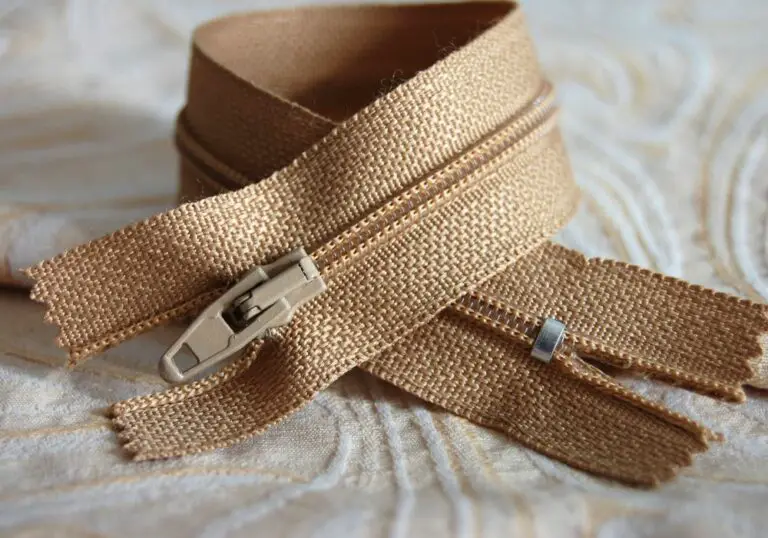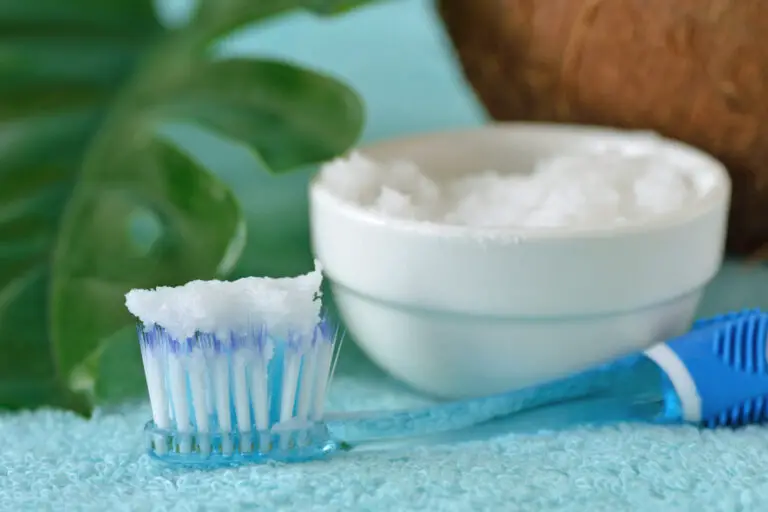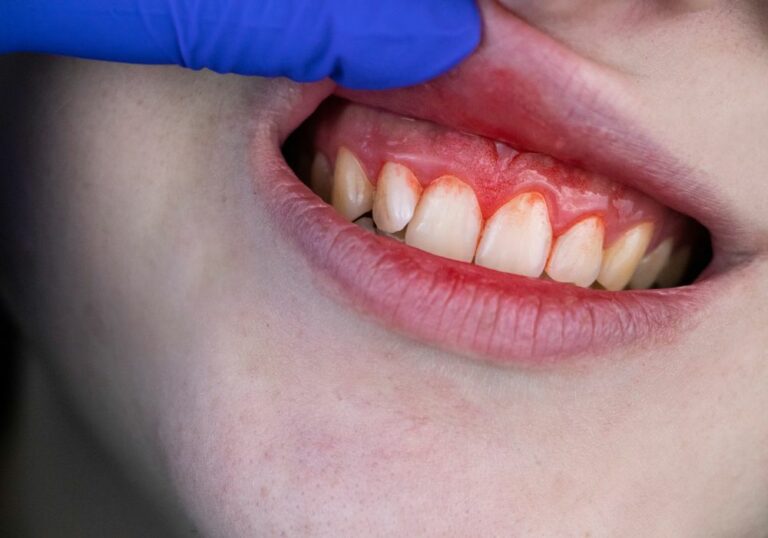Have you ever wondered if it hurts when your puppy’s teeth fall out? As a responsible pet owner, it’s natural to be concerned about your furry friend’s health and wellbeing. Puppy teething can be a challenging time for both you and your pup, but it’s essential to understand what to expect during this process.
Puppy teeth, also known as deciduous teeth, begin to emerge when your furry friend is around two weeks old and are usually fully grown in by eight to ten weeks old. During this time, your pup may experience discomfort and pain as their teeth grow and fall out to make room for their adult teeth. However, this pain is generally manageable and should not cause your puppy significant distress. In this article, we’ll explore the topic of puppy teething and answer the question, “Does it hurt when puppy teeth fall out?” to help you better understand your pup’s development and how to care for them during this time.
Understanding Puppy Teething Process
As a new puppy owner, it’s important to understand the teething process your furry friend is going through. Teething is a natural process that all puppies go through as they grow and develop their adult teeth. It can be a painful and uncomfortable time for your puppy, but there are things you can do to help ease their discomfort.
Timeline of Puppy Teething
Puppy teething usually begins around 3-4 weeks of age when their baby teeth start to come in. The teething process lasts until around 6-8 months of age when all of their adult teeth have fully developed. During this time, your puppy will lose their baby teeth and their adult teeth will grow in.
Signs of Puppy Teething
There are a few signs that your puppy is teething. These include:
- Chewing on everything: Your puppy will chew on anything they can get their teeth on to help relieve the pain and discomfort of teething.
- Drooling: Your puppy may drool more than usual during the teething process.
- Irritability: Your puppy may be more irritable than usual due to the pain and discomfort of teething.
- Loss of appetite: Your puppy may not want to eat as much during the teething process due to the pain and discomfort.
How to Help Your Puppy During Teething
There are several things you can do to help your puppy during the teething process. These include:
- Provide chew toys: Give your puppy plenty of chew toys to help relieve their pain and discomfort. Make sure the toys are safe and durable.
- Cold treats: Give your puppy cold treats like frozen carrots or ice cubes to help numb their gums.
- Massage their gums: Gently massage your puppy’s gums with your finger to help relieve their pain.
- Avoid hard treats: Avoid giving your puppy hard treats like bones or antlers as they can damage their teeth.
By understanding the teething process and taking steps to help your puppy during this time, you can help ensure they grow up with healthy teeth and gums.
Signs of Puppy Teeth Falling Out
As your puppy grows, they will start to lose their baby teeth to make way for their adult teeth. This process is a natural part of their development and usually starts around 3-4 months of age. Here are some signs to look out for when your puppy’s teeth start to fall out:
- Blood spots on toys or chew objects: When your puppy’s teeth start to fall out, you may notice some blood spots on their toys or chew objects. This is normal and nothing to worry about.
- Excessive chewing: Your puppy may start to chew more than usual as their teeth become loose and fall out. This is because chewing can help ease the discomfort they may be feeling.
- Decreased appetite: If your puppy is experiencing discomfort from their teeth falling out, they may not want to eat as much as they usually do. This is normal and should only last a few days.
- Puppy teeth on the floor: You may find your puppy’s teeth on the floor or in their bedding. This is a sign that their teeth are falling out, and it’s nothing to worry about.
It’s important to note that not all puppies show signs of discomfort when their teeth are falling out. Some puppies may not even seem to notice at all. If you’re concerned about your puppy’s teeth falling out, it’s always best to consult with your veterinarian.
Does It Hurt When Puppy Teeth Fall Out?
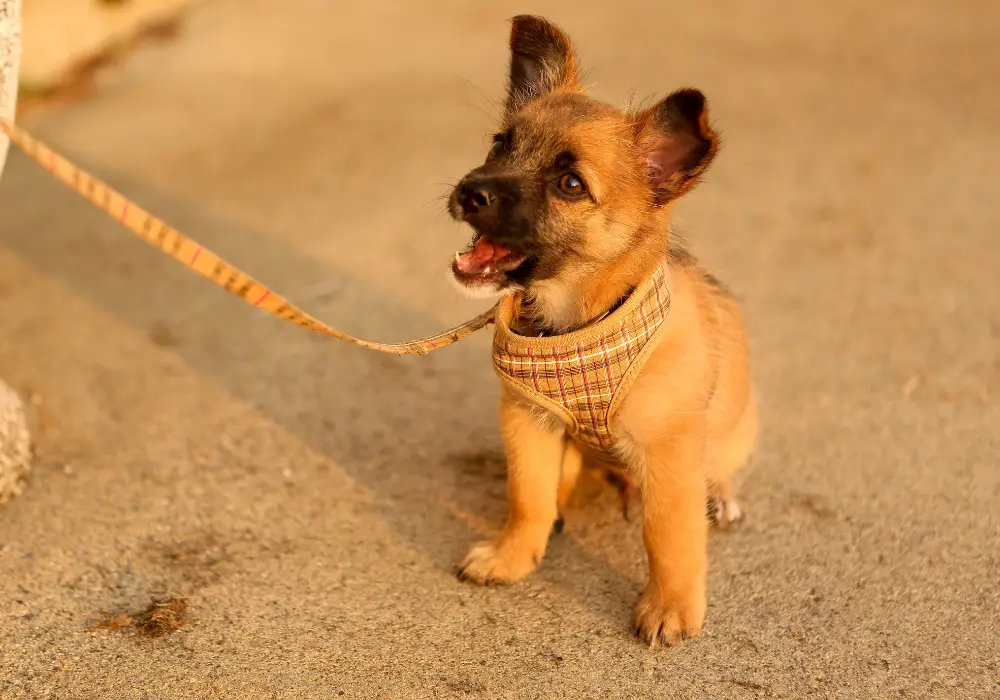
As a new puppy owner, you may be wondering if it hurts when your puppy’s teeth fall out. The short answer is yes, but it’s not as painful as you may think. In this section, we’ll explore the physical indicators and behavioral changes associated with puppy teething.
Physical Indicators
When your puppy’s baby teeth fall out, you may notice a small amount of blood on their toys or in their mouth. This is completely normal and is caused by the root of the tooth breaking away from the gum. You may also notice that your puppy’s gums are swollen or red, and they may drool more than usual.
To help alleviate any discomfort your puppy may be experiencing, you can provide them with safe chew toys specifically designed for teething puppies. These toys can help relieve the pressure on their gums and provide a distraction from any pain they may be feeling.
Behavioral Changes
As your puppy’s teeth begin to fall out, you may notice changes in their behavior. They may become more irritable or restless, and they may chew on objects they normally wouldn’t. This is because chewing helps alleviate the discomfort associated with teething.
It’s important to keep an eye on your puppy during this time and make sure they have plenty of safe chew toys to play with. You should also avoid giving them any hard treats or toys that could damage their new teeth.
In conclusion, while puppy teething can be uncomfortable for your furry friend, it’s a natural and necessary process. By providing them with appropriate chew toys and monitoring their behavior, you can help make the transition as smooth and painless as possible.
How to Help Your Puppy During Teething
Teething is a natural process that puppies go through as they grow, and it can be a painful and uncomfortable experience for them. As a responsible pet owner, there are several ways you can help your puppy during this time.
Safe Chewing Options
One of the best ways to help your puppy during teething is to provide them with safe chewing options. Chewing helps to relieve the pain and discomfort associated with teething, and it also helps to strengthen their teeth and jaws.
Puppy Teething Toys
Puppy teething toys are a great option for safe chewing. These toys are designed to be durable and safe for your puppy to chew on. Look for toys that are made from non-toxic materials and are the appropriate size for your puppy’s breed and age.
Proper Nutrition
Proper nutrition is also important during the teething process. Make sure your puppy is getting a balanced diet that includes plenty of protein, vitamins, and minerals. This will help to support their overall health and promote healthy teeth and gums.
In addition to providing safe chewing options and proper nutrition, it’s also important to be patient with your puppy during this time. Teething can be a frustrating experience for both you and your puppy, but with the right care and attention, you can help them through it and come out the other side with a happy and healthy dog.
When to Consult a Veterinarian
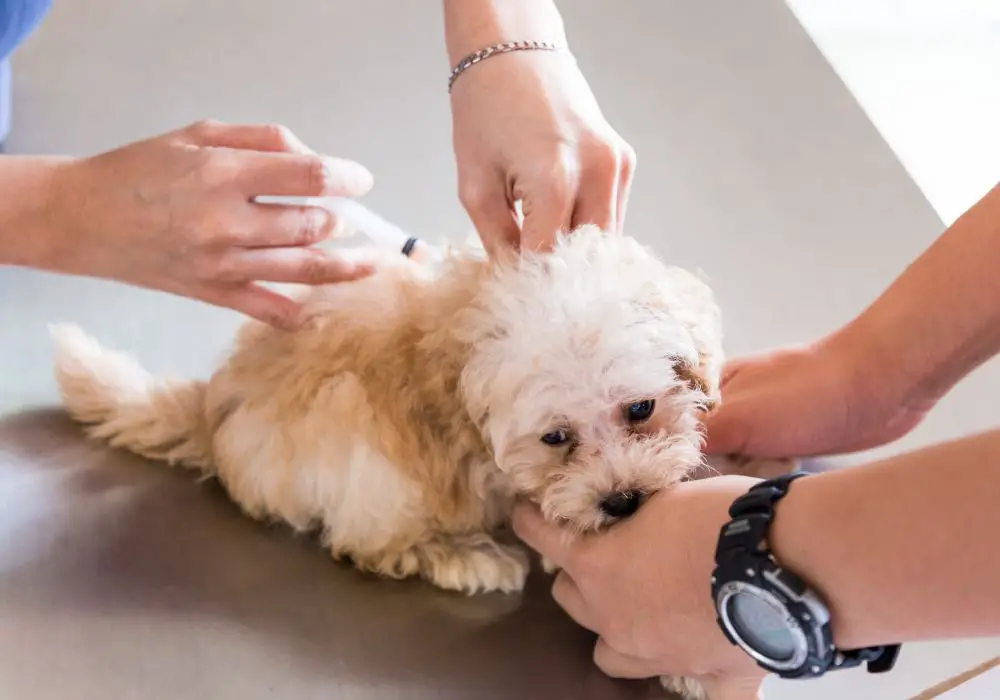
If your puppy is experiencing persistent pain or infection risks during teething, it is important to consult a veterinarian for proper treatment.
Persistent Pain
While some discomfort during teething is normal, persistent pain may indicate an issue that requires medical attention. If your puppy seems to be in pain for an extended period of time, it could be a sign of retained baby teeth, gum inflammation, or other dental problems. Your veterinarian can examine your puppy’s mouth and recommend appropriate treatment, such as tooth extraction or medication.
Infection Risks
Puppy teething can also increase the risk of infection. As baby teeth fall out, the empty sockets can become a breeding ground for bacteria, leading to gum disease or other infections. Signs of infection may include swelling, redness, or discharge around the affected area. If you notice any of these symptoms, it is important to seek veterinary care as soon as possible to prevent the infection from spreading.
In addition to these specific concerns, it is always a good idea to consult with your veterinarian if you have any questions or concerns about your puppy’s teething process. Your veterinarian can provide advice on how to soothe your puppy’s discomfort and ensure that their teeth are coming in properly. By working together with your veterinarian, you can help ensure that your puppy’s teething experience is as smooth and comfortable as possible.
Frequently Asked Questions
How can I help soothe my puppy’s teething pain?
Teething can be a painful process for puppies, but there are several things you can do to help soothe their discomfort. One option is to provide your puppy with a cool, damp washcloth or a frozen chew toy to help numb their gums. You can also try massaging their gums with your fingers or offering them a puppy-safe teething gel.
What are some symptoms of puppy teething?
Puppy teething can cause a variety of symptoms, including drooling, chewing on objects, and irritability. You may also notice that your puppy’s gums are swollen or that they have bad breath. Additionally, some puppies may experience a loss of appetite or diarrhea during teething.
What are some good puppy teething toys?
There are many different types of teething toys available for puppies, including rubber toys, rope toys, and chew bones. Look for toys that are specifically designed for puppies and are made from safe, non-toxic materials. It’s also a good idea to choose toys that are durable and can withstand your puppy’s strong chewing.
How can I help my puppy’s teeth fall out naturally?
Most puppies will naturally lose their baby teeth as their adult teeth begin to come in. However, you can help facilitate this process by providing your puppy with plenty of chew toys to help loosen their baby teeth. It’s important to never pull or force a baby tooth out, as this can cause pain and damage to your puppy’s mouth.
What are some ways to help a teething puppy sleep?
Teething can be particularly uncomfortable for puppies at night, so it’s important to help them get a good night’s rest. You can try providing your puppy with a warm, comfortable bed and a soft blanket to snuggle with. Additionally, you may want to offer them a chew toy or a frozen treat to help soothe their gums before bedtime.
Do puppies experience pain when their teeth fall out?
While puppies may experience some discomfort during the teething process, they typically do not experience significant pain when their baby teeth fall out. In fact, most puppies will simply swallow their baby teeth as they come out, without even realizing it. If you notice any signs of pain or discomfort in your puppy, it’s important to consult with your veterinarian to rule out any underlying health issues.

